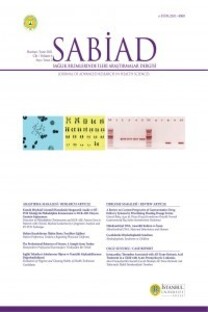LIPOPOLYSACCHARIDE INHIBITS AUTOPHAGY IN HUMAN DERMAL FIBROBLASTS IN VITRO
Autophagy, human dermal fibroblast, inflammation, lipopolysaccharide
LIPOPOLYSACCHARIDE INHIBITS AUTOPHAGY IN HUMAN DERMAL FIBROBLASTS IN VITRO
Autophagy, human dermal fibroblast, inflammation, lipopolysaccharide,
___
- Grozescu T, Popa F. Prostate cancer between prognosis and adequate/proper therapy. J Med Life. 2017;10(1):5-12.
- Yayın Aralığı: Yılda 3 Sayı
- Başlangıç: 2018
- Yayıncı: İstanbul Üniversitesi
DIETARY-BASED MOLECULAR TARGETS AND THERAPEUTIC OPPORTUNITIES IN CANCER
microRNA AS A PROMISING POTENTIAL BIOMARKER FOR COLORECTAL CANCER
Milad ASADİ, Ayşe CANER, Venus ZAFARİ, Ahmad AL-OMAR, Can MUFTUOGLU, Tuoraj ASVADİ KERMANİ
Can MUFTUOGLU, Ufuk MERT, Emin TAVLAYAN, Milad ASADİ, Özlem ÖZKAYA AKAGÜNDÜZ, Ayşe CANER
miRNA-REGULATED PATHWAYS OF CD8+T CELLS IN TNBC MOUSE MODEL
Muge OCAL-DEMİRTAS, Doç. Dr. Bala GÜR DEDEOĞLU
DOWNREGULATION OF SLC-16 CAN INCREASE APOPTOSIS LEVEL IN GASTROINTESTINAL CANCER
Milad ASADİ, Dariush SHANEHBANDİ, Ayse CANER, Habin ZARREDAR, Shahram GASEMBAGLOU, Venus ZAFARİ, Tuoraj ASVADİ KERMANİ, Ayşe CANER
INVESTIGATION OF THE EXPRESSION LEVEL OF miR 142-3P IN OVARIAN CARCINOMA
Yasemin GIDER, Khariqa JABBARLİ, Gamze UYAROĞLU, Demet AKDENİZ ÖDEMİŞ, Buğra TUNCER, Büşra KURT, Seda KILIÇ ERCİYAS, Özge ŞÜKRÜOĞLU ERDOĞAN, Betül ÇELİK, Hülya YAZICI
THERAPEUTIC IMPLICATIONS OF TARGETED SEQUENCING AND miRNA-SEQ OF B CELL LYMPHOMAS
Esra Esmeray SÖNMEZ, Tevfik HATİPOĞLU, Xiaozhou HU, Hongling YUAN, Ayça ERŞEN DANYELİ, Ayla ANAR ARICI, Ahmet ŞEYHANLI, Zühal ÖNDER SİVİŞ, Bengü DEMİRAĞ, Eda ATASEVEN, Dilek İNCE, Zekiye ALTUN, Safiye AKTAŞ, İnci ALACACIOĞLU, Tuğba SÜZEK, Nazan ÖZSAN, Taner Kemal ERDAĞ, Elvan Caglar CİTAK, Sermin ÖZ
TRANSCRIPTOMIC DIFFERENCES IN MONOZYGOTIC TWINS WITH OVARIAN CANCER
Gözde KURU TÜRKCAN, Demet AKDENİZ ÖDEMİŞ, Büşra KURT, Buğra TUNCER, Seda KILIÇ ERCİYAS, Özge ŞÜKRÜOĞLU ERDOĞAN, Hülya YAZICI
